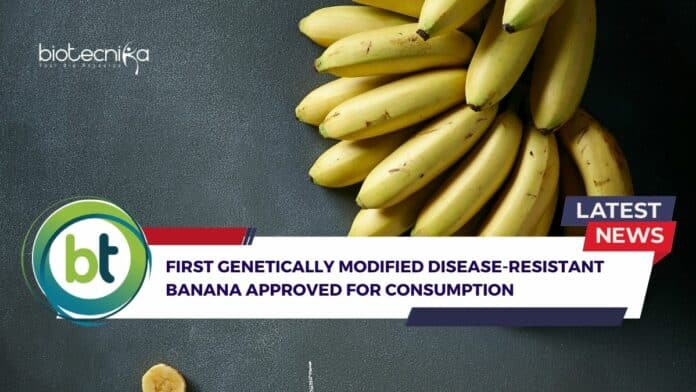Unveiling the First Disease-Resistant Genetically Modified Banana for Consumption
In a groundbreaking development, a disease-resistant genetically modified banana has been approved for consumption, marking a significant milestone in the field of agricultural science. This new variety, QCAV-4, has been engineered to combat the Panama Tropical Race 4 fungal disease, a devastating threat to banana crops worldwide for which no treatment currently exists. Let’s delve deeper into this innovative achievement and explore its implications for the future of food safety and sustainable agriculture.
Introduction to QCAV-4: The Game-Changing Banana
The approval of QCAV-4 by food safety regulators represents a major step forward in the realm of genetically modified organisms (GMOs) used in food production. Unlike conventional bananas, this new variety is equipped with a crucial genetic modification that confers resistance to the destructive Panama Tropical Race 4 disease. This breakthrough is particularly significant considering the lack of effective treatments available to combat this lethal fungal infection, which poses a serious threat to global banana cultivation.
The Work Behind the Innovation: Meet Agricultural Scientist James Dale
Agricultural scientist James Dale and his dedicated team are the masterminds behind the creation of QCAV-4. By integrating a gene from the wild banana variety Musa
acuminata ssp malaccensis into the popular Cavendish banana, they have successfully developed a disease-resistant variant that holds immense promise for the future of banana cultivation. This collaborative effort exemplifies the power of genetic engineering in addressing pressing challenges faced by the agricultural industry.Implications for Food Security and Sustainability
The approval of QCAV-4 opens up new possibilities for enhancing food security and sustainability. By providing a robust defense mechanism against the Panama Tropical Race 4 disease, this genetically modified banana has the potential to safeguard banana crops and ensure a stable food supply for communities around the world. Additionally, this innovation highlights the role of biotechnology in developing resilient crop varieties that can thrive in the face of environmental threats.
RNA-Editing Therapies: A Promising Frontier in Genetic Medicine
In parallel to the advancements in agricultural biotechnology, RNA-editing therapies have emerged as a promising avenue for treating genetic disorders. These innovative treatments involve precise modifications at the RNA level to correct mutations associated with various conditions, such as alpha-1 antitrypsin deficiency and Stargardt disease. Unlike traditional gene editing techniques, RNA editing offers a more targeted approach with potentially reduced risks and transient effects, paving the way for safer and more effective genetic therapies.
Promoting Gender Diversity in Mathematics: Breaking Barriers and Encouraging Inclusivity
The underrepresentation of women in mathematics and science fields continues to be a pressing issue, as reflected in the limited number of female mathematicians receiving top honors. Efforts to bridge the gender gap and promote diversity in mathematical research are crucial for fostering inclusivity and recognizing the contributions of underrepresented groups. By advocating for greater visibility of female researchers and implementing structural changes in prize selection processes, the mathematics community can work towards a more equitable and inclusive future.
Navigating the Intersection of Agriculture and Renewable Energy: Balancing Farming with Solar Power
The intersection of agriculture and renewable energy presents a complex challenge that requires thoughtful consideration and innovative solutions. Initiatives such as ‘agriphotovoltaic’ systems aim to integrate solar energy production with agricultural practices, striking a balance between electricity generation and crop cultivation. By exploring sustainable approaches that prioritize both food production and renewable energy generation, we can move towards a more harmonious coexistence between farming and solar power.
Embracing Urban Greening for Equitable Cities: Debunking Myths and Embracing Change
The concept of ‘urban greening’ has sparked debates surrounding issues of gentrification, equity, and environmental sustainability. While some critics view green cities as a symbol of elitism and exclusion, others emphasize the importance of integrating green spaces into urban landscapes for the well-being of city residents. By adopting a holistic approach that prioritizes equity and inclusivity, urban greening initiatives can contribute to creating more vibrant, accessible, and fair cities for all.
Paving the Way for a Sustainable and Inclusive Future
The approval of the disease-resistant genetically modified banana and the advancements in RNA-editing therapies highlight the transformative potential of biotechnology in addressing critical challenges in agriculture and healthcare. By promoting diversity in mathematics, navigating the complexities of renewable energy in agriculture, and embracing urban greening initiatives, we can collectively work towards building a more sustainable, inclusive, and resilient future.
Keywords: Disease-resistant genetically modified banana, RNA-editing therapies, gender diversity in mathematics, urban greening, sustainable agriculture



























